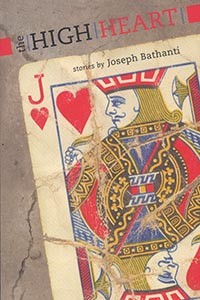The High Heart
By Joseph Bathanti
Eastern Washington University Press, 199 pages, $14.95
Joseph Bathanti grew up in Pittsburgh in the 1960s and early '70s, which gives him plenty of company. But if the stories in his collection The High Heart resonate with both the working-class experience and the concerns of a much-chronicled generation, they do so with a tough lyricism, as well as a deceptive simplicity.
All 14 stories revolve around one character, Fritz Sweeney, following him from childhood to early adulthood. The stories aren't arranged chronologically, but they do overlap, each illuminating another facet of a world built around a dysfunctional family, a Catholic-school upbringing, and the mad and desperate characters, young and old, whom Fritz meets coming of age in the microcosm of hardscrabble East Liberty. Despite recurring characters and situations, Bathanti's themes feel like they develop, rather than simply repeat.
Fritz's chaotically moody mother, Rita, is the collection's radioactive core, the other characters drawn to the glow, repulsed by the poison. Travis, his soft-hearted, accomodating father, is a waiter in a posh city restaurant; Rita's job is restaurant "hostess." And then there's her bizarre, sexually charged relationship with her brother, Pat, whose success in business she's always bitterly contrasting to her own husband's abject ambitionlessness.
Home life, complete with his hard-drinking parents' graveyard-shift schedule, takes a toll on Fritz, who in the opening story, "Hod," is a directionless new high school graduate working on Pat's masonry crew.
I was usually in bed by nine, worn out by the hod. I never prayed to God. I felt like a mongrel, and looked like one too. I'd think about my future, but all that appeared on the screen was static, a scrambled signal. Jesus Christ. I knew my mother was a stripper, not a hostess. And I had no idea what was up between her and my father. Then, for some reason, I'd start worrying about the scaffold, the gable I'd be climbing the next morning with a hundred ungainly pounds on my back, Ted yapping at me to step it up, goddammit, as I tightroped on a moldy two-by-six across the abyss.
Bathanti offers the texture of the physical world, teen-age angst in straightforward terms, the rhythms unforcedly jazzy, the characters hard-edged but never definitively settled, always capable of surprise. In "Scaffold," he juxtaposes Fritzie's mortal fear of climbing the scaffold with his mysterious, mentor-like co-worker Shotty's probably fabricated story about how his Vietnam-vet son died. As Fritz speculates on the true story, "Scaffold" edges briefly into metafiction, but still ends up exploring that place where you sympathize with someone you know is bullshitting you.
In "Fading Away," Bathanti manages the tricky feat of explicitly incorporating Big Ideas -- in this case, Jungian archetypes -- into a short narrative about Fritzie's ill-fated relationship with a young woman whom he's known since childhood, and the threateningly powerful men in her life.
"Lover" vividly etches a guilt-ridden triangle between Fritz, his best friend, Keith, and Keith's girlfriend, Bonnie, who is pregnant and wants an abortion -- which shatters Catholic boy Keith, who forces Fritz to take his confession. The title story, meanwhile, concerns a poker game that turns from uneasily companionable to pathetically violent. A heated little drama about social privilege, "High Heart" sums things up a little too neatly, but it is devastating nonetheless, a merciless eulogy for the losing class.
Not all the stories work equally well. In "Decoration Day," for instance, Bathanti toggles between two different time periods, and marries his characteristic realism to supernatural visions a young Fritzie seems to be having. It's too much for one story. But such disappointment is more than redeemed by the book's longest story, "The School for the Blind." High school wrestling is familiar fictional terrain, but Bathanti uses the setting -- its climax his St. Sebastien's match against the titular Oakland school -- to skillfully weave all his themes into one comic and poignant narrative.
Bathanti, who left Pittsburgh 30 years ago, now teaches creative writing at Appalachian State University, in North Carolina; he's also published two novels, East Liberty (2001) and Coventry (2006). In The High Heart -- set between Camelot and Watergate -- he makes you virtually feel the troubled innocence of the '60s slipping into the dissolution and anxiety of the '70s, at least as it happens through the eyes of one directionless kid who manages to keep intact both his cynicism and his ability to feel.














